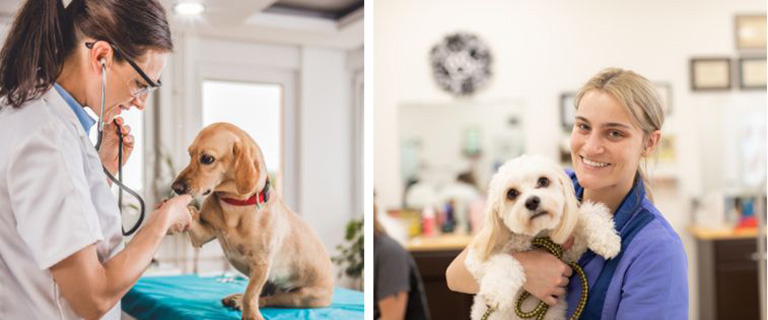As pet owners, ensuring the health and well-being of our furry companions is paramount. This responsibility involves both routine grooming and regular veterinary care. Understanding the roles of veterinarians and groomers, as well as knowing when to seek their assistance, is essential for providing the best care for your pets. In this blog, we’ll explore the distinct roles of veterinarians and groomers, discuss common health and grooming concerns and provide guidance to help you determine which professional to turn to for your pet’s specific needs.
Understanding the Roles
Groomers
Groomers specialize in the art of pet grooming to enhance both the well-being and physical appearance of animals. Their primary responsibility revolves around maintaining pets’ hygiene. Commonly known for their expertise in bathing, haircuts and nail trimming, groomers provide a range of services aimed at keeping pets clean, comfortable and looking their best.
Regular grooming helps prevent common issues such as matting, which can lead to skin irritation and discomfort. Groomers also play a vital role in detecting potential health concerns during grooming sessions, such as skin infections or abnormal growths, allowing for early intervention and treatment. Additionally, services like nail trimming prevent overgrowth, which can lead to painful conditions like ingrown nails or joint problems.
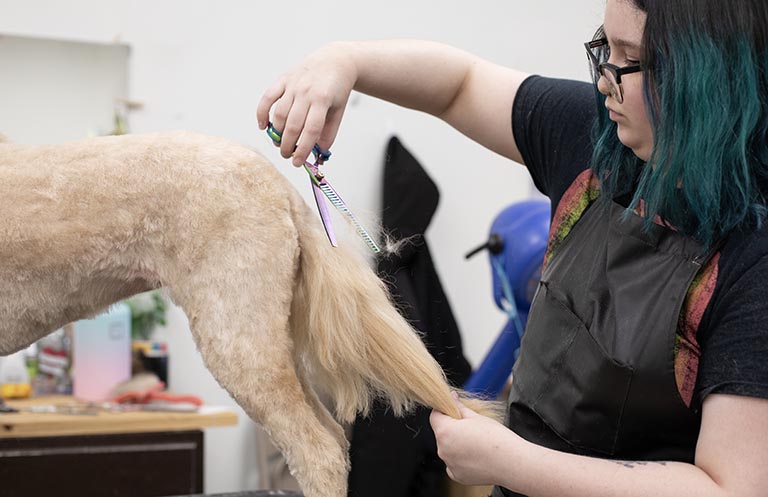
Veterinarians
Veterinarians focus on the comprehensive care of animals, ranging from domestic pets to livestock and even wildlife. Vets are trained professionals equipped to diagnose and treat a wide array of medical conditions that affect animals, and they provide an array of services from routine check-ups to emergency surgeries.
Common issues addressed by veterinarians encompass a broad spectrum, including preventive care such as vaccinations to protect against infectious diseases, routine examinations to monitor overall health and the diagnosis and treatment of illnesses ranging from minor infections to chronic conditions. Vets are also skilled in performing surgical procedures, whether it’s a routine spaying/neutering or a complex operation to address a serious health concern.
Within the field of veterinary medicine, specialization allows vets to focus on specific areas of expertise. These specializations can range from dermatology and oncology to cardiology and orthopedics. By honing their skills in a particular area, specialized veterinarians can offer targeted and advanced care tailored to the unique needs of animals suffering from specific health conditions. This diversification within the profession ensures that animals receive the highest standard of care, regardless of their ailment or species.
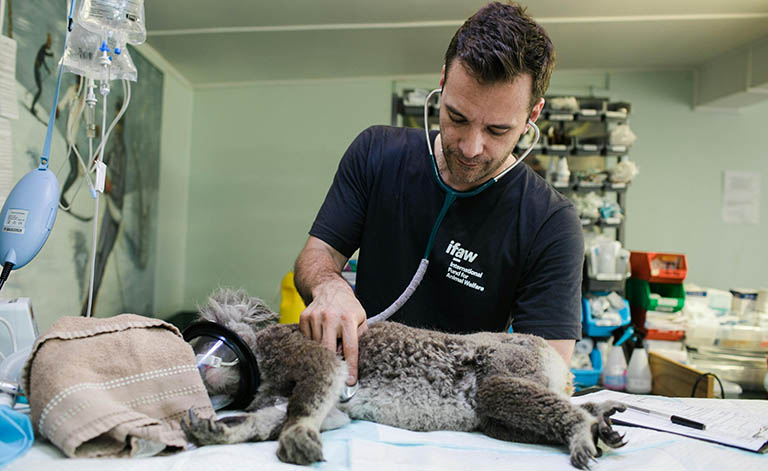
Health Concerns vs. Grooming Needs
Recognizing Grooming Needs
Understanding the signs that indicate a need for grooming is essential for your furry companions. One unmistakable sign is matted fur, which occurs when loose hair becomes tangled and forms tight knots, leading to discomfort and skin irritation if left unaddressed. Overgrown nails are another indication that grooming is overdue, as excessively long nails can cause pain, difficulty walking and even lead to joint issues over time.
Additionally, a persistent bad odor emanating from your pet may signify the need for grooming, as it could indicate the presence of dirt, oil buildup or skin infections that require attention. Tear stains, caused by excessive tearing and moist fur around the eyes, are also common in some breeds and may require regular cleaning to prevent staining and irritation.
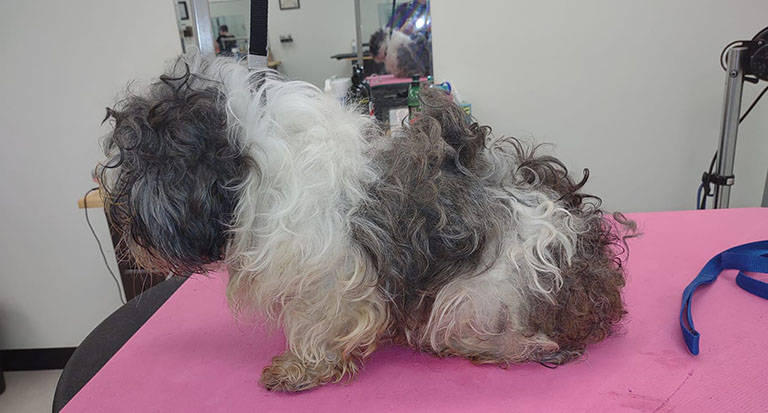
Identifying Health Concerns
One sign that indicates a need for veterinary care is a change in behavior, such as lethargy, excessive panting or restlessness, which could indicate underlying health issues. Visible injuries, such as cuts, bruises or limping, should also prompt a visit to the vet for proper evaluation and treatment. Changes in eating habits, such as loss of appetite or excessive thirst, may signal various health concerns, from dental problems to gastrointestinal issues.
Common health issues that warrant veterinary attention encompass a wide range of conditions, including infections, allergies and parasites. Infections, whether bacterial, viral or fungal, can manifest as skin irritations, respiratory problems or urinary tract issues, requiring prompt diagnosis and treatment by a veterinarian.
Allergies, which can affect pets similarly to humans, may present as skin rashes, itching or digestive upset, necessitating veterinary intervention to identify triggers and manage symptoms effectively. Parasites, such as fleas, ticks and worms, pose significant health risks to pets and may lead to serious illnesses if left untreated, underscoring the importance of regular veterinary care for preventive measures and timely treatment.
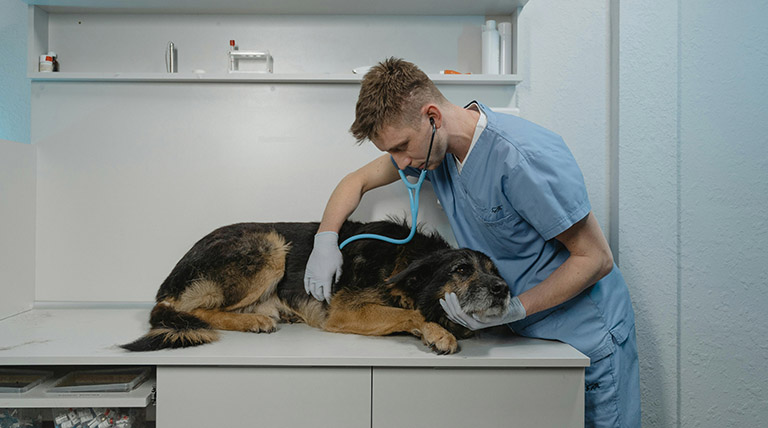
Scenarios: Vet or Groomer?
In order to address your pet’s health concerns effectively, it’s important to understand when to seek assistance from a pet groomer versus a veterinarian for various issues.
Skin and Coat Problems
Groomers can offer assistance with milder skin and coat problems, such as mild dandruff or dry skin, through gentle grooming techniques and appropriate grooming products. Routine coat maintenance, including regular brushing, bathing with pet-safe shampoos and trimming, can help prevent matting, reduce shedding and promote overall skin and coat health. Groomers can also provide valuable advice on proper grooming techniques and recommend products suitable for specific skin and coat conditions.
Skin issues that necessitate a vet’s expertise include persistent rashes, sores or lesions, which may indicate underlying health conditions such as allergies, infections or dermatitis. Hair loss beyond normal shedding patterns or bald patches could also signify more serious issues requiring veterinary evaluation and treatment.
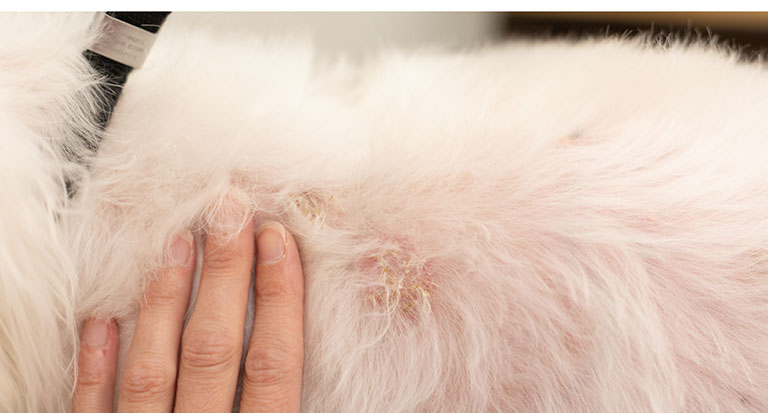
Nail and Paw Care
Groomers are skilled in safely trimming nails to an appropriate length, reducing the risk of overgrowth, breakage and injury. Additionally, groomers can provide thorough paw care, including inspecting for signs of injury or irritation, gently cleaning between the toes, and moisturizing paw pads to prevent dryness and cracking. Regular grooming appointments with a groomer help maintain paw health, promote comfort during walking and prevent potential complications associated with neglected nails and paws.
Veterinary intervention is warranted when nail or paw issues escalate to infections or severe conditions like ingrown nails. Infections, indicated by swelling, redness or discharge around the nail bed, require prompt veterinary evaluation and treatment to prevent complications and alleviate discomfort. Similarly, ingrown nails, where the nail grows into the surrounding skin, can cause pain, inflammation and even lead to infection if not addressed promptly, highlighting the need for veterinary care.
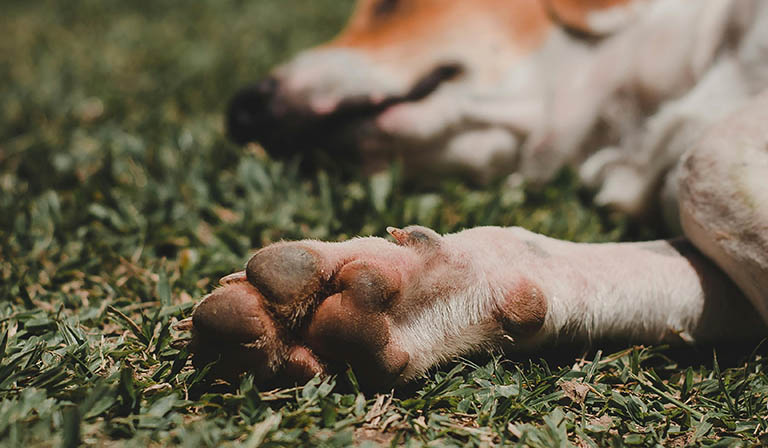
Dental Health
While veterinarians play a crucial role in addressing dental issues, groomers also contribute to maintaining dental hygiene through routine grooming practices. Groomers can educate pet owners on the importance of dental care and recommend at-home dental hygiene routines, such as regular tooth brushing with pet-safe toothpaste and toothbrushes. Groomers may suggest dental chews or treats designed to promote oral health by reducing plaque and tartar buildup and freshening breath. Pet grooming salons like Smoochie Pooch offer toothbrushing as an add-on service, emphasizing the importance of dental care in a pet’s grooming routine.
Dental issues that require veterinary attention include tooth decay and gum disease, which can lead to pain, infection and even systemic health problems if left untreated. Tooth decay, characterized by cavities and deterioration of tooth structure, requires veterinary intervention for assessment and potential treatments like dental cleanings or extractions. Similarly, gum disease, marked by inflammation, bleeding gums and tartar buildup, necessitates veterinary care to prevent progression to more severe stages and potential tooth loss.
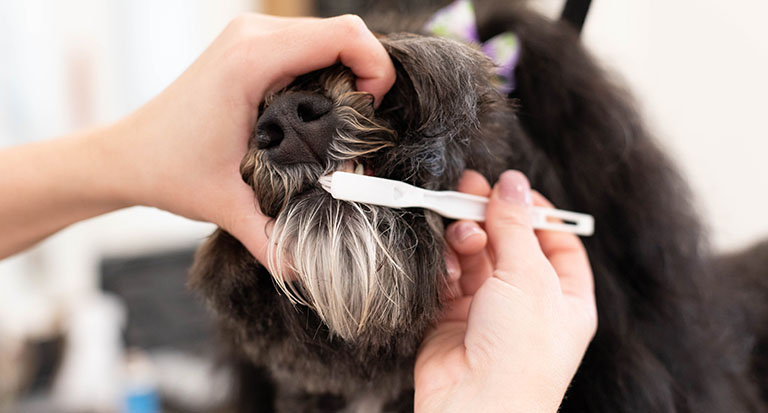
Ears and Eyes
Pet groomers contribute to routine cleaning and maintenance to prevent common issues and promote overall health. Groomers can gently clean ears to remove excess wax and debris, reducing the risk of infections and discomfort. However, it’s important to note that groomers typically don’t perform deep cleaning inside the ears. Instead, they focus on gentle exterior cleaning to remove visible dirt and debris. Similarly, they can carefully wipe around the eyes to remove tear stains and debris, enhancing comfort and minimizing the risk of eye irritation.
Veterinary care is indispensable for addressing serious ear or eye problems, such as infections or injuries, which can lead to discomfort and complications if left untreated. Veterinarians are equipped to diagnose and treat these issues effectively, ensuring the well-being of your pet’s sensory organs. They can also provide deep cleaning for a dog’s ear when necessary.
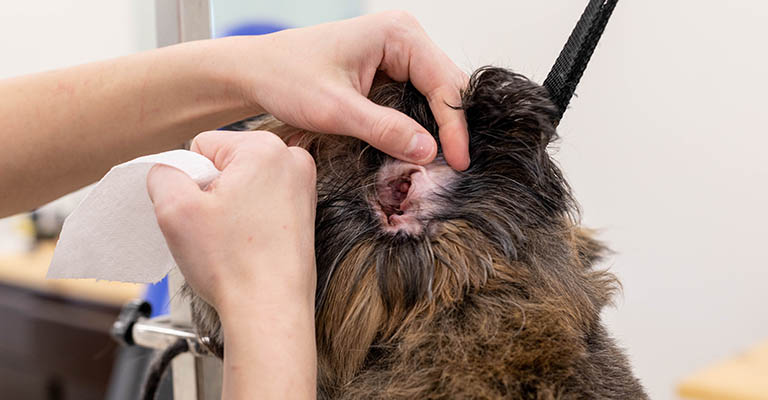
Anal Glands
Anal gland expression is a topic that often arises in discussions about pet grooming and veterinary care. Veterinarians possess the necessary training to address both the external and internal anal glands of a dog. This comprehensive approach ensures that any issues with the anal glands are thoroughly evaluated and treated, providing relief and preventing potential complications.
On the other hand, groomers typically focus solely on expressing the external anal glands during grooming sessions. While this can provide some relief and help maintain comfort for the pet, it’s important to recognize that groomers do not address the internal anal glands. These glands are deeper and may require veterinary attention if there are underlying issues or complications.
Choosing the Right Professional
Finding a Skilled Groomer
Start by seeking recommendations from fellow pet owners, friends or family members who have had positive experiences with groomers in your area. Their firsthand insights can help you narrow down your options.
Next, conduct online research to learn more about local groomers, their services and customer reviews. Look for groomers who are experienced, licensed and have a good reputation for providing compassionate and professional care to animals.
Inquire about a groomer’s or pet salon’s techniques, the products they use and their approach to handling pets during grooming sessions. Have them explain their policies on scheduling appointments, handling emergencies and accommodating special requests or instructions.
Additionally, ask about the groomer’s facilities and cleanliness standards, as well as their experience with your pet’s breed or specific grooming requirements. Discuss pricing, payment options and any additional services they offer, such as nail trimming or ear cleaning.
Finding a Qualified Vet
When searching for a qualified veterinarian, we suggest seeking recommendations from trusted sources such as friends, family or local pet communities. Their experiences can offer valuable insights into the quality of care provided by different veterinary clinics.
Research prospective veterinarians online, checking their qualifications, experience and reviews or testimonials from previous clients. Look for veterinarians who are licensed, experienced and compassionate towards animals.
When choosing a vet, it’s important to ask the right questions to assess their suitability for your pet’s needs. Inquire about their approach to preventive care, emergency services availability and their experience with your pet’s species or breed. Clarify their fees and payment options, as well as their policies on appointments, follow-ups and after-hours care.
Other important questions to consider include the clinic’s facilities and equipment, their approach to pain management and anesthesia, and their referral network for specialized treatments or consultations.
A Collaborative Effort
The collaborative efforts of groomers and veterinarians are crucial for maintaining the health, comfort and happiness of your beloved pets. While veterinarians provide expert medical care and address serious health concerns, groomers play a crucial role in routine grooming and hygiene maintenance. By recognizing the signs that indicate when to seek veterinary care versus grooming assistance, pet owners can ensure their furry companions receive the comprehensive care they deserve. Whether it’s addressing health issues or maintaining grooming needs, prioritizing the well-being of our pets requires informed decision-making and proactive engagement with trusted professionals.



